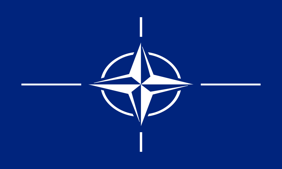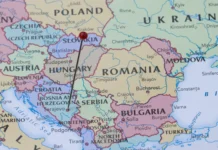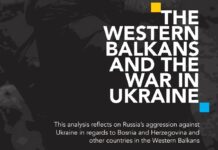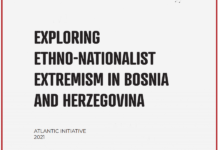On the 22.02.2010 in Sarajevo Alumni Marshall Center organized a roundtable on the subject: “Should the Country’s Responsibilities Cease Following NATO Accession”. The participants were international representatives and representatives from Bosnia and Herzegovina.
In his opening speech Mr. John P.Rose, the director of George C.Marshall Center for Security Studies, said that he is glad to have had 153 men and women from Bosnia and Herzegovina studying in the Marshall Centre. He also spoke about new security issues such as energy security, global warming, weapons of mass destruction, migration etc. It is important to know, when dealing with these issues, that no one nation can solve such problems, therefore it is fundamental to work together. Also, you always need to ask the question: What are the goals to be achieved? This is the most important question when dealing with all sorts of crisis and it is a smart way of looking at how you can address serious problems.
The next speech was held my Professor Dragan Lozančić (professor of the Marshall European Center for Security Studies that comes from Croatia) who talked about the new strategic concepts of NATO. As he emphasized, it is too early to talk about Croatia’s experience in NATO, but he used the opportunity to give an overall personal opinion on the critical issues while facing a path to NATO membership. In the 90ties Croatia had the will for NATO partnership, but there was lack of policy and strategy. When the situation in 2002 improved, it was because they developed a strategic objective, and that was to join NATO. The political aspects of this journey were the hardest, and that meant overcoming issues such as repatriation of refugees, dealing with war crimes etc. A very strong factor was also public opinion, and Croatia started to work on that issue 2 years before actually entering the Alliance. The arguments for joining were: cross-benefit effect (joining NATO will secure a general feeling of safety, but it will also bring good publicity for Croatia to join EU as well), ideas and values of NATO were not only Constitutional, but they are generally shared by the Croatian people, and finally the psychological component (for Croatia to be in NATO and EU is like coming home). There are also a few myths concerning public opinion about NATO, such as: myth of a military base (people think that by joining NATO, their country will be forced to have NATO military bases on its ground-not true!), myth of loosing sovereignty, myth of tourism decrease, myth that the Alliance is controlled by the Americans…
Speaking about the new NATO strategic concept, he emphasized that NATO has and is been going through changes (such as an increasing number of the Eastern European countries in the Alliance), politically and security related. NATO is now concerned about these issues; for example, geopolitical extent, relations with Russia, territorial defense, article 5, energy security, climate change, enlargement, partnerships, Mediterranean dialogue… and being a member of the Alliance means having an opinion on all of these issues! This was very hard for Croatia (as it is probably going to be hard for Bosnia and Herzegovina) because being a part of Yugoslavia in the past meant being neutral. And now, when they became a member of NATO, the objective that they achieved has become a tool, but it also means balancing your own interests with the interests of the Alliance and other members. For the end of his speech, Professor Dragan Lozančić stressed out the fact that Croatia is giving a strong lobby for Bosnia and Herzegovina’s application for MAP.
The next speech was held by Brigadier General John W.Bullard who spoke about NATO’s ability to adapt to new challenges (technological advances, communications, new security threats, military issues etc). NATO’s self-evaluation (for example, self assessments from 1986, 1991, 1999…) is one of the reasons that it has survived as such a successful alliance. The principals of NATO are the same from the first day it was created, but the strategic concept are adjustable to challenges of the 21 Century, and that is crucial. It is also important for the new strategic concept to be a global institution, where partnerships are essential.
After hearing these tree interesting presentations, the round table was opened for discussion.
During the discussion, Minister of Foreign Affairs of Bosnia and Herzegovina Sven Alkalaj said that it is important to use other experiences to shorten our path toward NATO. Bosnia and Herzegovina is a specific country that succeeded in reforming Armed Forces from tree belligerent armies into one united Armed Force. There is also a political agreement and a will to join NATO, so the declination of MAP was very disappointing to Bosnia and Herzegovina. Minister Alkalaj also mentioned preparations for the next few months to show an increasing progress of Bosnia and Herzegovina toward the Alliance. He also used the opportunity to thank everybody who is lobbying for B&H.
During the discussion, Minister of Security of Bosnia and Herzegovina Sadik Ahmetović mentioned the correlation between Bosnia and Herzegovina’s EU and NATO integration and the departure of international community from our country. He said that once we integrate into NATO and ensure our stability and safety, international community will not be needed here.
Further on in the discussion, Minister of Defense of Bosnia and Herzegovina Selmo Cikotić highlighted the importance of nontraditional response to new security threats and challenges that are possibly not even visible. He also emphasized that Bosnia and Herzegovina is a key to Western Balkans stability. He concluded that the answer to the question of the roundtable is negative. At the end, he thanked Marshall Center for a great cooperation with our country and with our Armed Forces.








